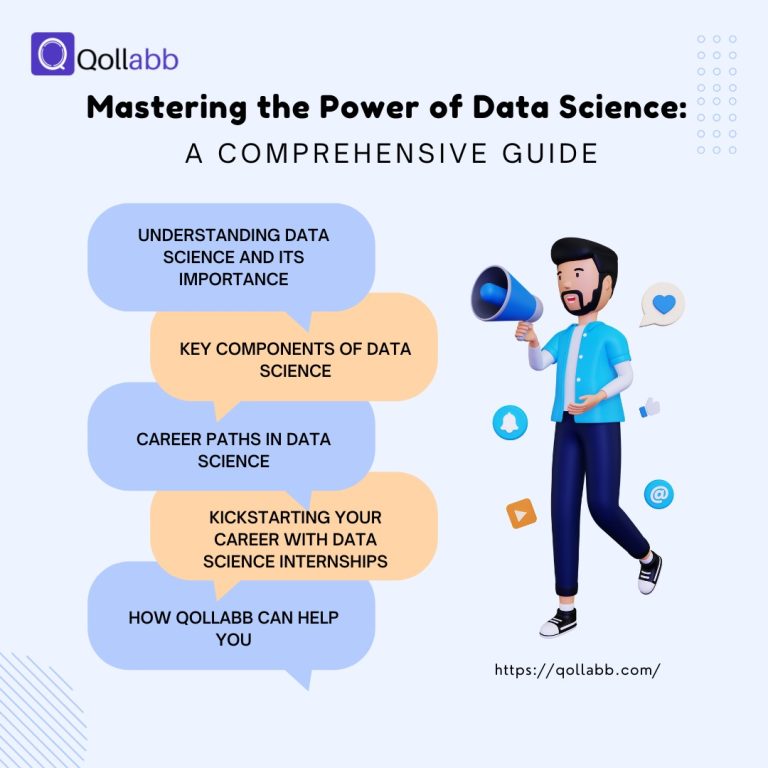In today’s data-driven world, data science has emerged as a cornerstone of innovation and progress. From powering predictive analytics to enabling personalized customer experiences, data science transforms raw data into actionable insights. This blog delves into the fundamentals of data science, its significance, key components, and how you can master data science to start your career with a data science internship in this dynamic field. By following this guide, you can master data science and unlock exciting career opportunities through a data science internship. A data science internship provides the hands-on experience needed to excel in this rapidly growing field.
Understanding Data Science and Its Importance
Data science is an interdisciplinary field combining statistical methods, mathematical algorithms, and computer science skills. Its primary goal is to extract meaningful insights from both structured and unstructured data. The process involves several key steps: data collection, cleaning, analysis, visualization, and interpretation. These steps are crucial for informing decision-making and solving complex problems.
In today’s world, data science holds significant importance for several reasons:
- Informed Decision-Making: Data science enables businesses to make data-driven decisions, reducing guesswork and improving outcomes.
- Predictive Analytics: It helps forecast trends and behaviors, allowing companies to anticipate and prepare for future demands.
- Personalization: Data science drives personalized customer experiences by analyzing consumer behavior and preferences.
- Operational Efficiency: By optimizing processes and identifying inefficiencies, data science helps businesses operate more effectively.
- Innovation: It fosters innovation by uncovering new insights and opportunities hidden in vast amounts of data.
Key Components of Data Science
Data science comprises several essential components that collectively transform data into valuable insights:
- Data Collection: Data is gathered from various sources like databases, web scraping, sensors, and surveys. The quality of this data significantly impacts the accuracy and reliability of the subsequent analysis.
- Data Cleaning: This step involves removing inaccuracies, inconsistencies, and missing values from the collected data, ensuring it is accurate and ready for analysis.
- Data Analysis: Statistical and computational techniques explore and examine the data, identifying patterns, correlations, and trends necessary for making informed decisions.
- Data Visualization: Data is represented in graphical formats such as charts, graphs, and dashboards, making complex data more understandable and accessible. Tools like Power BI are often used in this stage.
- Machine Learning: A subset of artificial intelligence, machine learning involves training algorithms to learn from data and make predictions or decisions. Python is frequently used for implementing machine learning models due to its simplicity and powerful libraries.
- Data Interpretation: This step translates the results of data analysis and machine learning models into actionable insights, informing business strategies and decision-making.
Career Paths in Data Science
Data science offers a diverse array of career opportunities, each requiring unique skills and expertise. Prominent career paths in this field include:
- Data Scientist: Employ advanced analytical techniques and machine learning algorithms to solve complex problems. Responsible for building models, analyzing data, and deriving insights that drive business decisions.
- Data Analyst: Focus on interpreting data and generating reports using statistical tools and languages like SQL to identify trends and patterns, aiding businesses in making informed decisions.
- Data Engineer: Design, build, and maintain the infrastructure required for data collection, storage, and processing. Ensure that data pipelines are efficient, scalable, and reliable. Proficiency in SQL and advanced Excel is crucial for this role.
- Machine Learning Engineer: Develop and deploy machine learning models. Work closely with data scientists to implement algorithms and ensure models perform effectively in real-world scenarios.
Kickstarting Your Career with Data Science Internships
Internships are an excellent way to gain practical experience and kickstart your career in data science. They offer hands-on learning opportunities and exposure to real-world projects.
Types of Data Science Internships
- Data Science Internships: Provide a comprehensive introduction to the field, involving data collection, cleaning, analysis, and visualization. Interns gain experience with tools like Power BI and programming languages such as Python.
- Data Entry Internships: Focus on accurate data entry and management, essential for maintaining data quality and integrity.
- SQL Internships: Teach how to write queries, manage databases, and perform data manipulation. SQL is a critical skill in data science.
- Python Internships: Provide practical experience in using Python for data analysis and machine learning, working on projects involving data cleaning, analysis, and model building using libraries like Pandas, NumPy, and Scikit-learn.
- Advanced Excel Internships: Teach advanced functions, pivot tables, and data visualization techniques. Excel remains a fundamental tool for many data science tasks.
- Power BI Internships: Focus on using Power BI to create interactive dashboards and reports, turning raw data into meaningful insights through dynamic visualizations and business intelligence solutions.
How Qollabb Can Help You
Finding the right internship can be challenging, but platforms like Qollabb make it easier. Qollabb connects students and recent graduates with real industry-based projects and internships offered by companies across various industries. It provides a platform for applying classroom knowledge to real-world scenarios, gaining valuable experience, and building your portfolio.
Why Choose Qollabb:
- Diverse Opportunities: Access to internships in data science, data entry, SQL, Python, and advanced Excel.
- Practical Experience: Work on real projects and gain hands-on experience.
- Industry Connections: Network with industry professionals and enhance your career prospects.
Conclusion
Data science is an exciting and rapidly growing field with immense potential. By understanding its key components and gaining practical experience through internships, you can build a successful career. Platforms like Qollabb provide the necessary tools and resources to get started. Embrace the data science journey, master data science, and realize your potential today! Master data science and unlock a future full of opportunities in this dynamic field.





